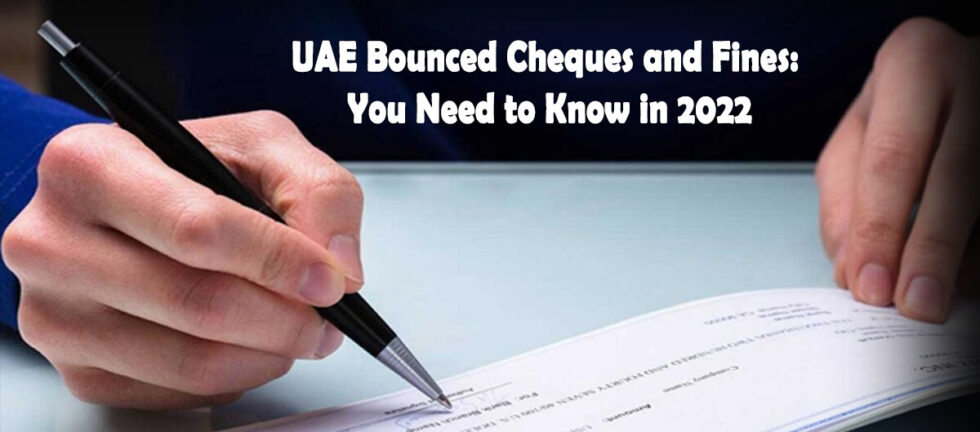In the UAE, the cheque bounce is a very frequent problem faced by people during their span in the country. Bounced cheque issues may arise in a variety of commercial transactions, including but not limited to, companies’ exchanges, bank loans, property rents or purchases and individual transactions. When the cheque issued gets bounced/ returned, or dishonored, it can lead to civil and/or legal proceedings and penalties can be financially severe and daunting.
WHAT IS A BOUNCED CHEQUE?
A bounced check is slang for a check that cannot be processed because the account holder has nonsufficient funds (NSF) available for use. Banks return, or “bounce”, these checks, also known as rubber checks, rather than honoring them, and banks charge the check writers NSF fees.
Four factors cause a cheque to be returned:
- Non-availability of funds equal to or more than the cheque amount on the date of issue.
- Technical errors like mismatched signatures, no or wrong date, over-written or scribbled text.
- Closure of the bank account before the issued cheque(s) is encashed.
- Instruction to the bank to withhold payment against the cheque.
BOUNCED CHEQUE IN THE UAE: THE CHANGES TO THE LAW FROM FEB 2022
Decriminalization
In Feb ,2022, the UAE put into effect Federal Law No. 14 of 2020, amending and repealing some of the previous laws governing bounced or returned cheques. Among the changes include the decriminalization of cheques issued without sufficient funds and punishment for a bounced cheque in the UAE. In most cases, jail time will not be considered. However, strict financial penalties are still enforced.
The new law specifically refers to the following acts, which if committed by the drawer, will be considered a crime of a bounced cheque punishable by criminal sanctions. These acts include the following:
- If the drawer orders the bank to not cash the cheque before the due date.
- If the drawer closes the account or withdraws the available balance prior to the due date.
- If the drawer deliberately signs the cheque inaccurately.
- If the drawer intentionally writes or signs the cheque in a way that prevents its cashing.
Previously, criminal actions could be filed in all matters related to bounced cheques which has now been limited under the new law.
Partial Payment of Cheque:
With the new amendments, the practice of partial payment of the cheque has now become mandatory. This applies if the amount available for payment is less than a given cheque’s value, then the drawee bank is now required to pay the amount partially.
The beneficiary can then proceed to claim the remaining amount by initiating legal measures through the civil courts. The banks in such instances will provide a ‘partial payment certificate’ to the presenter of the cheque with all the basic details of the issuer of the cheques such as the emirates id/passport number, trade license details (if issuer is a company), IBAN number, contract details such as telephone and address.
Further, the courts may issue an order against the issuer of the cheque to pay the entire cheque amount or the remaining balance due on the cheque
Applicable Penalties:
The new amendment has revised the penalties and imposes the following:
- Whoever endorses or delivers a bearer cheque while knowing that there are sufficient funds to pay such cheque or that such cheque may not be drawn shall be subject to a penalty of no less than 10% of the cheque value, subject to the minimum of AED 1,000, and no more than the cheque value. The penalty shall be double in case of repetition (ref: Article (641) Bis (1))
- An order of withdrawal of existing cheque book from a person convicted of breaching this law and also to prevent such convicted defendant from obtaining any further cheque books for up to five years. (Ref: Article (643))
- Convicted defendant who does not surrender his existing cheque books to respective banks within fifteen (15) days from notifying him to do so shall be sentenced to a penalty of no less than AED 50,000 (AED Fifty Thousand) and no more than AED 100,000 (AED One Hundred Thousand). (Ref: Article (643))
- Any bank which violates the order provided for in the above two paragraphs shall be sentenced to a penalty of no less than AED 100,000 and no more than AED 200,000. (Ref: Article (643))
Takeaway:
New law makes procedures faster. Strong civil alternatives lead to the collection of the cheque value in the fastest and simplest possible way, including:
- Obligating the bank to pay the cheque (at least partially).
- Making a cheque from the drawee’s bank account with non-sufficient fund an executive document to be implemented directly through the execution judge, without resorting to lengthy legal procedures, as was the case previously.
- This means that there is no need to file a police report, or a complaint and ensuing follow-up of procedures with the police and prosecution, then the courts. In this case, the cheque has the power of an executive bond that does not require a court ruling, which should expedite legal action. This should strengthen the cheque as a payment tool in commercial and financial transactions.

Alia Noor (FCMA, CIMA, MBA, GCC VAT Comp Dip, Oxford fintech programme, COSO Framework)
Associate Partner
Ahmad Alagbari Chartered Accountants






